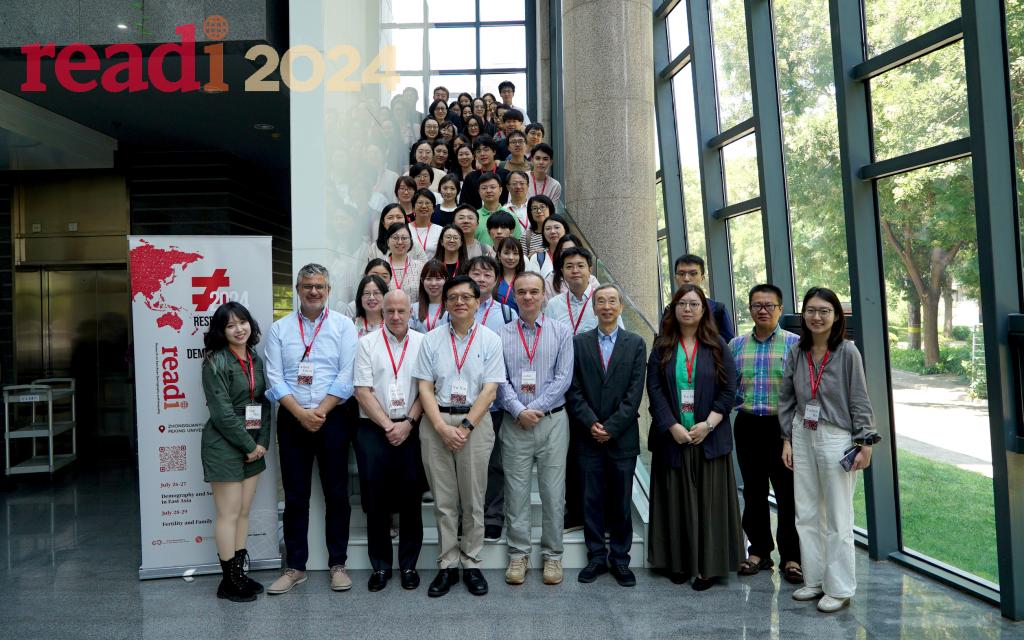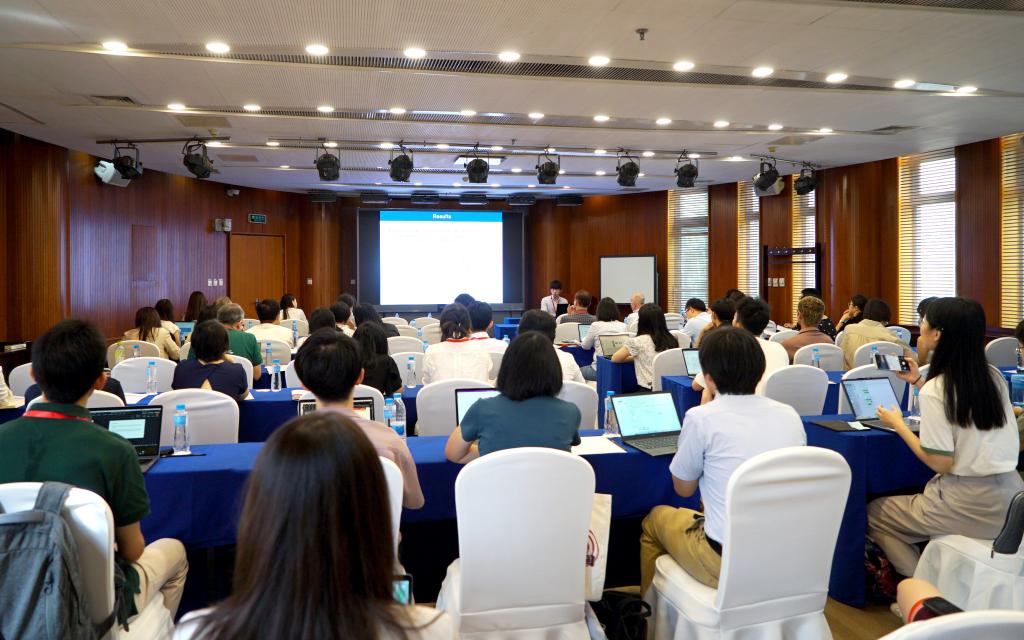The 2024 “Research on East Asian Demography and Inequality” Conference has been successfully held during July 26th to 29th, in Zhongguanyuan Global Village, Peking University, Beijing, China. The conference was hosted by Center for Social Research at Peking University, and co-organized by Center on Contemporary China and Global Japan Lab at Princeton University.

There were 57 participants and about 20 audience members coming to the conference, who were from 28 different institutions including Princeton University, Peking University, the University of Tokyo, Seoul National University, Universitat Autònoma de Barcelona, Brown University, etc. 46 submissions were received and 44 of them were shared on site.

The conference sessions on the first two days concentrated on demography and social stratification in East Asia, including work and family, education and child development, health, elderly, migration, youth and value, marriage and housework, on which 27 presentations were given to the audience. While the session on the last two days were primarily cover topics for fertility and family, and 17 presentations were made on this session.
Below are some of the research abstracts presented on the conference.
Fumiya Uchikoshi from Princeton University presented a paper titled "The Role of Skill Portability in Shaping Women’s Career Trajectories: Evidence from Japan." (July 26th)
This study provides a novel explanation for occupational gender segregation in the labor market through the lens of skill portability. It focuses on the role of firm-specific versus school-specific skills in shaping the career choices of individuals of different genders. Using panel data from Japan, the study finds that, compared to men, women's first job choices are more closely related to their consideration of skill portability when selecting future careers, with school type and other factors serving as important mediating mechanisms.
Jia Wang from The Hong Kong Polytechnic University reported on a paper titled "The Gendered Long Arm of Childhood: Early Parent-child Relationship and Later-life Mental Health in Rural China." (July 26th)
This study explores how early childhood parent-child relationships influence mental health outcomes later in life, with a particular emphasis on the role of gender based on stress process theory and gender-specific life course theories. It addresses two questions: first, whether early parent-child relationships affect mental health outcomes in adulthood, and if so, whether there are gender differences; and second, whether educational attainment in adulthood moderates these effects and if there are gender differences in the moderating effects. Using CHARLS panel data, the study finds that poor early parent-child relationships have a more significant impact on depressive symptoms among adult women than men, confirming gender differences in the long-term effects of childhood experiences. Additionally, educational attainment significantly moderates mental health outcomes, demonstrating a gradient effect, but this moderation does not differ significantly between genders.
Cheng Cheng from Singapore Management University presented a paper titled "Gendered Social Participation, Gendered Effects: Spouses’ Social Participation and Mental Health among Chinese Older Couples." (July 26th)
Previous research has primarily focused on individual social participation's impact on mental health, neglecting the spouse's perspective. This study introduces the spouse's social participation to examine two research questions: first, how the relative social participation between spouses affects older adults' mental health; and second, whether these effects vary by gender and social activity type. By analyzing three types of social activities (visiting friends, dancing or exercising in parks, playing cards or chess), the study confirms that the relative social participation between spouses significantly impacts older adults' mental health. In rural China, both older women and men's mental health can be enhanced through participation in traditional gender-specific social activities. However, when women do not engage in traditional female-oriented activities while their husbands do, it exacerbates women's depressive symptoms. In urban China, gender differences are present but minimal.
Yichun Yang from Peking University reported on a study titled "The Role of Early-Life Grandparenting Experience in the Multidimensional Development of Adults." (July 27th)
While most research systematically examines the effects of grandparenting on older adults, little is known about its long-term impact on grandchildren. This study adopts a life course perspective to examine how early grandparenting experiences influence adults' multidimensional development, including non-cognitive abilities, mental and physical health, socioeconomic status, and interpersonal trust. Using CLDS data, the analysis reveals that early grandparenting experiences significantly and negatively affect adults' development, with the pre-school period being the most critical. Specifically, being cared for by grandparents during pre-school years has a more pronounced negative impact on adults' mental health and non-cognitive skills. Furthermore, the study confirms the cumulative disadvantage effect of grandparenting, with longer durations of early grandparenting resulting in greater cumulative disadvantages in adult development.
Albert Esteve delivered the keynote speech titled “Global Variations in Living Arrangements: Persistent and Emerging Trends.” (July 28th)
Esteve began by defining living arrangements and introducing the " Coresidence project", which has compiled a database of living arrangements and research findings from 1964 to 2021 across 157 countries. This includes data such as the average household size, average number of children, and average number of relatives living together in various countries. He highlighted the project's contribution to the measurement of household living arrangements by proposing a simplified measurement method for family structures.
Building on this foundation, Esteve presented both cross-sectional and longitudinal comparisons of living arrangements across countries using this simplified measurement method. For instance, he pointed out that the most notable feature from comparing China's 1982 and 2000 census data is the increasing proportion of households consisting only of couples. Similarly, comparing the 2000 and 2020 U.S. census data revealed that a stable feature of American household structure is the high proportion of elderly people living alone.
Additionally, Esteve took a global perspective to further compare the variation in time people spent in different living arrangements across countries and provided hypotheses on future trends in living arrangements. He points out that Most changes will occur in the developing world and among older populations. Demographic change will be the major factor influencing living arrangements. The living arrangements of older people will depend on what happens now with intergenerational co-residence with adult children.
Dehoon Lee from Seoul National University presented a talk titled “How Does Population Concentration Matter for Demographic Behaviors in a Lowest-Low Fertility Context? Internal Migration, Marriage, and Childbearing in South Korea.” (July 28th)
Lee's research focuses on South Korea's low fertility rate and the trend of population concentration in the country's major metropolitan areas (SMAs). His study examines how this trend affects demographic behaviors, particularly first marriage and first childbirth. To address this research question, Lee used microdata from South Korean surveys and event analysis. He demonstrated the risks of first marriage and first childbirth among SMA residents, SMA migrants, and non-SMA residents, highlighting recent trends.
The findings indicate that, compared to non-SMA residents, SMA residents, migrants from non-SMAs to SMAs, and migrants from SMAs to non-SMAs are more likely to experience delayed marriage and childbirth, or even non-marriage and childlessness. This observation aligns with the adaptation hypothesis. Additionally, the socialization hypothesis is partly supported for migrants from SMAs to non-SMAs. Furthermore, the disruption hypothesis and the contagious convergence hypothesis also received partial support. The results underscore the significant role of population concentration in influencing marriage and fertility behaviors.
Yuying Tong from the Chinese University of Hong Kong delivered a speech titled "Domestic Gender Equality and Fertility Outcome in China." (July 28th)
Tong began by introducing the current low fertility situation in China and the theoretical explanations for low fertility, highlighting sociologists' interest in the impact of gender equality, particularly spousal equality, on low fertility rates. Building on this theoretical background, the study compared the differences between the practice and perception of spousal equality and their impact on the risk of having a second child. The study found that, overall, men's participation in housework is positively correlated with the likelihood of having a second child, but this relationship is non-linear and takes an inverted U-shape. This relationship also exhibits heterogeneity: women with higher educational attainment and those whose education level is higher relative to their husbands are less sensitive to their husbands' involvement in housework. Furthermore, the inconsistency between the perception and practice of gender equality, with practice lagging behind the perception, also reduces the probability of women having a second child. The study's conclusions provide insights into alleviating work-family conflicts.
Yuchen He from Peking University presented on “Shotgun Marriage and Child Development in China.” (July 28th)
Yuchen He began by introducing the background of the Second Demographic Transition and the "diverging destinies" framework. Yuchen He pointed out that, given China's context of tightly linked package of marriage and childbirth, child-centeredness culture, high accessibility of abortions, and gender asymmetry, the impact of premarital pregnancy on child development might differ from the Western "diverging destinies" framework. Using data from the China Family Panel Studies (CFPS) and propensity score matching methods, the study found that the impact of premarital pregnancy on child development is primarily reflected in low birth weight, but it does not have a significant effect on children's deviant behavior or depression. This might be due to the high accessibility of abortions and the universal intensive parenting. Additionally, the impact of premarital pregnancy on children shows gender asymmetry, with negative effects on health and educational opportunities primarily affecting girls.
Zhang Yang from Renmin University of China presented “Gendered Strategic Family Resilience: Health Declines and Intergenerational Relationships in Multi-Child Chinese Families.” (July 28th)
Zhang first introduced the perspective of the life course on intergenerational relationships, highlighting the unique cultural and modernization background of China. Zhang raised research questions regarding whether intergenerational relationships are affected by the health of elderly parents, whether there are differences among siblings, and whether these differences vary with the gender of the children. The study categorized intergenerational relationships into five types: Alienated, Stressfully Interacting, Independent, Beneficially Interacting, and Tight-knit, and measured the parents' physical, psychological, and cognitive health.
Using data from the China Longitudinal Aging Social Survey (CLASS), the research found that when the health of elderly parents (both physical and cognitive) deteriorates, the closest parent-child relationships become closer, while the most distant relationships become more independent. This leads to increased variance in parent-child relationships among multiple children. After the health of elderly parents declines, parent-child relationships among multiple adult children become more diffuse, driven mainly by the larger increase in the closest parent-child relationships. When elderly parents face health issues, having daughters may lead to closer intergenerational relationships and increased diversity in these relationships. Gendered family responses often rely on daughters' hidden cognitive labor and effort. Parent-child relationships are more responsive to declines in physical and cognitive health than to mental health.
Ryota Mugiyama from Gakushuin University presented on "Does Policy Reform Increase Fertility and Marriage Desires of Unmarried Childless People? A Factorial Survey Experiment in Japan." (July 29th)
Mugiyama first discussed Japan's low fertility context and the policy measures aimed at alleviating low fertility rates. He pointed out that, given the strong link between marriage and childbearing in East Asian societies, Japan's work-family policies targeting parents not only affect fertility desires but also influence the marriage and fertility desires of never-married and childless individuals. To test this hypothesis, Mugiyama's study designed a conjoint experiment within a social survey, examining the impact of various policies such as overtime restrictions, parental leave policies, flexible work policies, fertility subsidies, daycare accessibility, university tuition, and tax changes on the marriage and fertility desires of never-married and childless individuals.
The study found that policy changes not only affect the fertility desires of married individuals but also influence the fertility and marriage desires of unmarried individuals. Furthermore, these policies also impact future prospects, such as providing free university tuition for all, thereby playing a significant role.
